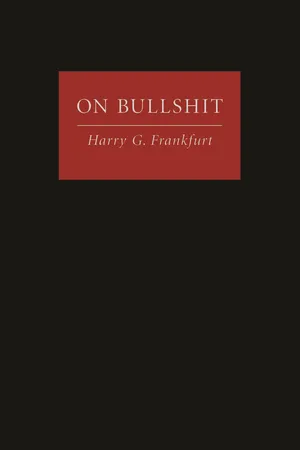![]()
ON BULLSHIT
![]()
One of the most salient features of our culture is that there is so much bullshit. Everyone knows this. Each of us contributes his share. But we tend to take the situation for granted. Most people are rather confident of their ability to recognize bullshit and to avoid being taken in by it. So the phenomenon has not aroused much deliberate concern, nor attracted much sustained inquiry.
In consequence, we have no clear understanding of what bullshit is, why there is so much of it, or what functions it serves. And we lack a conscientiously developed appreciation of what it means to us. In other words, we have no theory. I propose to begin the development of a theoretical understanding of bullshit, mainly by providing some tentative and exploratory philosophical analysis. I shall not consider the rhetorical uses and misuses of bullshit. My aim is simply to give a rough account of what bullshit is and how it differs from what it is not—or (putting it somewhat differently) to articulate, more or less sketchily, the structure of its concept.
Any suggestion about what conditions are logically both necessary and sufficient for the constitution of bullshit is bound to be somewhat arbitrary. For one thing, the expression bullshit is often employed quite loosely—simply as a generic term of abuse, with no very specific literal meaning. For another, the phenomenon itself is so vast and amorphous that no crisp and perspicuous analysis of its concept can avoid being procrustean. Nonetheless it should be possible to say something helpful, even though it is not likely to be decisive. Even the most basic and preliminary questions about bullshit remain, after all, not only unanswered but unasked.
So far as I am aware, very little work has been done on this subject. I have not undertaken a survey of the literature, partly because I do not know how to go about it. To be sure, there is one quite obvious place to look—the Oxford English Dictionary. The OED has an entry for bullshit in the supplementary volumes, and it also has entries for various pertinent uses of the word bull and for some related terms. I shall consider some of these entries in due course. I have not consulted dictionaries in languages other than English, because I do not know the words for bullshit or bull in any other language. Another worthwhile source is the title essay in The Prevalence of Humbug by Max Black.1 I am uncertain just how close in meaning the word humbug is to the word bullshit. Of course, the words are not freely and fully interchangeable; it is clear that they are used differently. But the difference appears on the whole to have more to do with considerations of gentility, and certain other rhetorical parameters, than with the strictly literal modes of significance that concern me most. It is more polite, as well as less intense, to say “Humbug!” than to say “Bullshit!” For the sake of this discussion, I shall assume that there is no other important difference between the two.
Black suggests a number of synonyms for humbug, including the following: balderdash, claptrap, hokum, drivel, buncombe, imposture, and quackery. This list of quaint equivalents is not very helpful. But Black also confronts the problem of establishing the nature of humbug more directly, and he offers the following formal definition:
HUMBUG: deceptive misrepresentation, short of lying, especially by pretentious word or deed, of somebody’s own thoughts, feelings, or attitudes.2
A very similar formulation might plausibly be offered as enunciating the essential characteristics of bullshit. As a preliminary to developing an independent account of those characteristics, I will comment on the various elements of Black’s definition.
Deceptive misrepresentation: This may sound pleonastic. No doubt what Black has in mind is that humbug is necessarily designed or intended to deceive, that its misrepresentation is not merely inadvertent. In other words, it is deliberate misrepresentation. Now if, as a matter of conceptual necessity, an intention to deceive is an invariable feature of humbug, then the property of being humbug depends at least in part upon the perpetrator’s state of mind. It cannot be identical, accordingly, with any properties—either inherent or relational—belonging just to the utterance by which the humbug is perpetrated. In this respect, the property of being humbug is similar to that of being a lie, which is identical neither with the falsity nor with any of the other properties of the statement the liar makes, but which requires that the liar makes his statement in a certain state of mind—namely, with an intention to deceive.
It is a further question whether there are any features essential to humbug or to lying that are not dependent upon the intentions and beliefs of the person responsible for the humbug or the lie, or whether it is, on the contrary, possible for any utterance whatsoever to be—given that the speaker is in a certain state of mind—a vehicle of humbug or of a lie. In some accounts of lying there is no lie unless a false statement is made; in others a person may be lying even if the statement he makes is true, as long as he himself believes that the statement is false and intends by making it to deceive. What about humbug and bullshit? May any utterance at all qualify as humbug or bullshit, given that (so to speak) the utterer’s heart is in the right place, or must the utterance have certain characteristics of its own as well?
Short of lying: It must be part of the point of saying that humbug is “short of lying” that while it has some of the distinguishing characteristics of lies, there are others that it lacks. But this cannot be the whole point. After all, every use of language without exception has some, but not all, of the characteristic features o...
